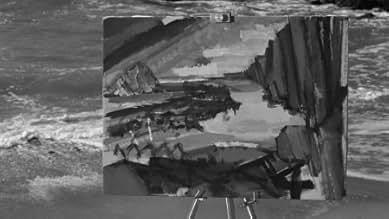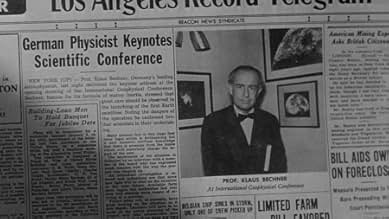VALUTAZIONE IMDb
6,1/10
2036
LA TUA VALUTAZIONE
Aggiungi una trama nella tua linguaAliens take five people, give them small capsules which can kill mankind without additional damage, with the understanding they will colonize Earth only if they use the weapons.Aliens take five people, give them small capsules which can kill mankind without additional damage, with the understanding they will colonize Earth only if they use the weapons.Aliens take five people, give them small capsules which can kill mankind without additional damage, with the understanding they will colonize Earth only if they use the weapons.
- Regia
- Sceneggiatura
- Star
Friedrich von Ledebur
- Dr. Karl Neuhaus
- (as Frederick Ledebur)
Fred Aldrich
- Russian Officer
- (non citato nei titoli originali)
Monty Ash
- Soviet Prison Physician
- (non citato nei titoli originali)
Irvin Ashkenazy
- 2nd Man
- (non citato nei titoli originali)
Charles Bennett
- Gorki
- (non citato nei titoli originali)
John Bleifer
- Spokesman
- (non citato nei titoli originali)
David Bond
- Dr. Schmidt
- (non citato nei titoli originali)
George Boyce
- Diplomat
- (non citato nei titoli originali)
Ralph Brooks
- Pentagon Officer
- (non citato nei titoli originali)
George Bruggeman
- Russian Officer
- (non citato nei titoli originali)
Recensioni in evidenza
1957's "The 27th Day' remains a seldom seen Columbia effort made on an obviously low budget without much in the way of special effects. Five people from different nations are chosen at random by a being from another world who identifies himself only as The Alien (Arnold Moss), his world dying but seeking to colonize the earth to survive. As their species abhors violence they need reassurance that mankind can put a stop to their self destructive tendencies, and to that end each of the five is given a small container with three capsules each, capable of wiping out all human life within a 3000 mile radius (the bombardment of radiation has no effect on plants or animals). Granting them the power of life and death, The Alien releases his captives unharmed, the five all facing difficult challenges ahead for they have only 27 days to use these tiny weapons before they are automatically deactivated. The Chinese girl, plucked from a burning village and without hope, takes her own life thus rendering her capsules useless. The Russian soldier is tortured by his superiors to reveal his secrets, the Soviet leader (Stefan Schnabel) eager to force the West to withdraw from Europe and Asia or face obliteration. German professor Klaus Bechner (George Voskovec) flies to Los Angeles for an important conference, only to hear a devastating worldwide broadcast by The Alien revealing the names of all five people in possession of the deadly capsules, injured by a speeding car and having his capsules confiscated by the United States government during his convalescence. Residing in Los Angeles is hot shot reporter Jonathan Clark (Gene Barry), swiftly going into hiding at a nearby race track after reuniting with English Rose Eve Wingate (Valerie French), the only recipient who immediately threw her capsules away into the ocean. Learning that an innocent man thought to be Clark was killed by a panicked mob, the pair decide to give themselves up to find a solution with Prof. Bechner's invaluable assistance, only 12 days left. The viewer is put in the position of wondering what to do in such a situation, and in the hands of comedy specialist William Asher things remain on a commendably serious level (Asher graduated from features to television, at the helm for BEWITCHED, starring his then-wife Elizabeth Montgomery). The ending is a bit too convenient to be credible but at this point adult sci fi was relatively rare, a welcome change from the more juvenile antics of something like "The Giant Claw." Good roles for reliable players like Paul Birch as the Admiral, Mel Welles as a Russian Marshal, and Paul Frees (seen as well as heard) as a newscaster, but Arnold Moss steals the film. A ubiquitous presence on television who did relatively few features, Moss is instantly recognizable by his Shakespearean voice, best remembered as Anton Karidian in STAR TREK's "The Conscience of the King."
An alien ship picks up five different people from the five super powers of the world. There he gives each a device that only they can open. Each device contains three vials that have the power to annihilate every human being on Earth. The aliens are a dying race from a dying planet, and even though they can and will not destroy mankind on earth, they will speed up the process of seeing whether mankind will destroy itself. How long is the experiment of seeing whether these five will survive and live without opening the vials? 27 days. This is a thought-provoking film about the nature of man more than anything. The underlying point behind the film is that mankind needs to rise from its child-like state of fighting and killing itself over seemingly petty issues. The aliens act merely as referees watching and waiting to see if the Soviet Union will destroy North America or vice versa. Now, the film definitely has an anti-communist slant(not that there is anything wrong with that)but admonishes all negativity, power hunger, and perniciousness in humankind worldwide. Director Will Asher does a fine job setting up the pace of the story and creating tension. The script, even though very weak in some areas, is quite interesting and full of thoughtful insights. Gene Barry plays the American representative and is good as a cynic. The rest of the cast is also very good with George Voskovec as a German scientist and Stephan Schnabel as a Soviet general standing out. Arnold Moss is the alien and he certainly makes his screen presence memorable. A good film. After watching I kept wondering what I would do if given the same circumstances, and I must confess I am so very happy that that burden lies not on my shoulders! Take some time to see The 27th Day and enjoy!
This movie is an underrated gem that has been overlooked by science fiction buffs. The 27th day rates with such films as: The Day The Earth Stood Still and The Thing From Another World. This movie was too cerebral for its' time. It examines the possibility of a superior life form, from another galaxy, providing mankind the power to obliterate life or to salvage life from our planet. The handling of this subject is done with intelligence, a good cast and a decent script.
The movie portrays the constant struggle between good and evil. In this case, with the paranoia of the cold war, the Russians are the ones who seek world domination. All in all a good movie to watch and enjoy. An 8 out of 10!!
The movie portrays the constant struggle between good and evil. In this case, with the paranoia of the cold war, the Russians are the ones who seek world domination. All in all a good movie to watch and enjoy. An 8 out of 10!!
Five Earthlings from different countries (including Gene Barry of "War of the Worlds" and lovely English actress Valerie French) are kidnapped by a Klaatu-like alien who gives each of them a palm-sized transparent case containing three silver capsules. The capsules have the power to make millions of humans vanish, without harming animals or causing destruction.
The alien's race desperately needs the planet Earth, but they are morally opposed to conquering it, so they give the war-pron Earthlings the ability to finish themselves off without devastating the planet in a nuclear war.
Don't expect any special effects except for two brief clips from "Earth versus the Flying Saucers", one space scene from "The Day the Earth Stood Still", and a small-scale test of the alien weapon. But the interior of the spacecraft is nicely done. This is an intelligent and uplifting movie, done on a small budget, although it's a bit too talky and actionless for some taste. John Mantley wrote both the screenplay and the original novel. In the novel the capsules had a somewhat more far-reaching (and disturbing) effect on humans than they do in the film. [Originally co-billed with "20 Million Miles to Earth"]
The alien's race desperately needs the planet Earth, but they are morally opposed to conquering it, so they give the war-pron Earthlings the ability to finish themselves off without devastating the planet in a nuclear war.
Don't expect any special effects except for two brief clips from "Earth versus the Flying Saucers", one space scene from "The Day the Earth Stood Still", and a small-scale test of the alien weapon. But the interior of the spacecraft is nicely done. This is an intelligent and uplifting movie, done on a small budget, although it's a bit too talky and actionless for some taste. John Mantley wrote both the screenplay and the original novel. In the novel the capsules had a somewhat more far-reaching (and disturbing) effect on humans than they do in the film. [Originally co-billed with "20 Million Miles to Earth"]
The underlying premiss of this film is quite interesting. Five people are kidnapped by a vastly superior alien race and each given a potentially toxic capsule. These capsules can only be opened upon the command of the owner, but if they ever are then mankind is doomed to eradication. The five are from different nations and all walks of life and once the alien announces to the assembled world the identities of the group, their lives become frantic and unsafe - a predicament they must endure for twenty-seven days if they are to save the population from certain death! Arnold Moss does his best "Klaatu" impersonation as the visitor and William Asher offers us a considered story about how ordinary people - and their governments - might react in such weighty circumstances. Gene Barry leads a rather unimpressive cast, however, and that really lets this decent story down somewhat. He wasn't very good at the best of times, and here neither he nor Valerie French's "Eve" do justice to the intrigue of the plot. The ending, even after a few viewings, is a bit disappointing - but the whole concept makes this well worth watching.
Lo sapevi?
- QuizThe glimpse given of the spacecraft reveals it to be from another Columbia release, La Terra contro i dischi volanti (1956). The scene was also used in Flying Saucer Daffy (1958) and an episode of Ai confini della realtà (1985).
- BlooperThe alien assumes that there are only two outcomes: humans use the weapons and destroy themselves, leaving Earth open for occupation OR humans don't use the weapons, and the alien species dies out, BUT there is a third, more likely outcome: the major powers use the capsules to attack each other (either pre-emptively or in retaliation) but millions of people in South America, Africa and Australia/Oceania remain alive (the five people chosen to control access to the weapons were all from the Northern hemisphere).
- Citazioni
Jonathan Clark: People hate because they fear, and they fear anything they don't understand, which is almost everything.
- ConnessioniEdited from La Terra contro i dischi volanti (1956)
I più visti
Accedi per valutare e creare un elenco di titoli salvati per ottenere consigli personalizzati
- How long is The 27th Day?Powered by Alexa
Dettagli
- Data di uscita
- Paese di origine
- Lingue
- Celebre anche come
- The 27th Day
- Luoghi delle riprese
- Azienda produttrice
- Vedi altri crediti dell’azienda su IMDbPro
- Tempo di esecuzione
- 1h 15min(75 min)
- Colore
- Proporzioni
- 1.37 : 1
Contribuisci a questa pagina
Suggerisci una modifica o aggiungi i contenuti mancanti































